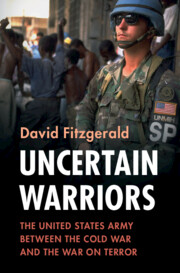Refine search
Actions for selected content:
44 results
8 - 2009
-
- Book:
- Choosing Defeat
- Published online:
- 07 October 2025
- Print publication:
- 07 October 2025, pp 227-257
-
- Chapter
- Export citation
Civilian Harm and Military Legitimacy: Evidence from the Battle of Mosul
-
- Journal:
- International Organization / Volume 79 / Issue 2 / Spring 2025
- Published online by Cambridge University Press:
- 01 July 2025, pp. 332-357
- Print publication:
- Spring 2025
-
- Article
-
- You have access
- Open access
- HTML
- Export citation
A Conversation with Claudia Junghyun Kim, author of Base Towns: Local Contestation of the U.S. Military in Korea and Japan
-
- Journal:
- Asia-Pacific Journal / Volume 21 / Issue 11 / November 2023
- Published online by Cambridge University Press:
- 14 March 2025, e6
-
- Article
-
- You have access
- Open access
- Export citation
Réduire le fossé culturel entre les forces armées et la société civile sans rompre avec le « compromis huntingtonien »
-
- Journal:
- Canadian Journal of Political Science/Revue canadienne de science politique / Volume 57 / Issue 2 / June 2024
- Published online by Cambridge University Press:
- 21 March 2024, pp. 308-324
-
- Article
- Export citation
Coup-proofing: latent concept and measurement
-
- Journal:
- Political Science Research and Methods / Volume 12 / Issue 4 / October 2024
- Published online by Cambridge University Press:
- 29 January 2024, pp. 799-820
-
- Article
- Export citation
Introduction
-
- Book:
- Netanyahu vs The Generals
- Published online:
- 11 January 2024
- Print publication:
- 18 January 2024, pp 1-19
-
- Chapter
- Export citation
4 - The Diminished Clout of the Generals
-
- Book:
- Netanyahu vs The Generals
- Published online:
- 11 January 2024
- Print publication:
- 18 January 2024, pp 119-144
-
- Chapter
- Export citation
5 - Populists versus the Security Establishment
-
- Book:
- Netanyahu vs The Generals
- Published online:
- 11 January 2024
- Print publication:
- 18 January 2024, pp 145-177
-
- Chapter
- Export citation
Conclusion
-
- Book:
- Netanyahu vs The Generals
- Published online:
- 11 January 2024
- Print publication:
- 18 January 2024, pp 178-190
-
- Chapter
- Export citation
1 - The Israeli Security Establishment on the Two-State Solution
-
- Book:
- Netanyahu vs The Generals
- Published online:
- 11 January 2024
- Print publication:
- 18 January 2024, pp 20-50
-
- Chapter
- Export citation
3 - Policy Disagreements
-
- Book:
- Netanyahu vs The Generals
- Published online:
- 11 January 2024
- Print publication:
- 18 January 2024, pp 88-118
-
- Chapter
- Export citation
2 - “Mr. Security”
-
- Book:
- Netanyahu vs The Generals
- Published online:
- 11 January 2024
- Print publication:
- 18 January 2024, pp 51-87
-
- Chapter
- Export citation
1 - The Post-Vietnam Recovery, Operation Desert Storm and the Veneration of the Volunteer Soldier
-
- Book:
- Uncertain Warriors
- Published online:
- 19 October 2023
- Print publication:
- 09 November 2023, pp 18-59
-
- Chapter
- Export citation

Uncertain Warriors
- The United States Army between the Cold War and the War on Terror
-
- Published online:
- 19 October 2023
- Print publication:
- 09 November 2023
Surviving revolution and democratisation: the Sudan armed forces, state fragility and security competition
- Part of
-
- Journal:
- The Journal of Modern African Studies / Volume 61 / Issue 3 / September 2023
- Published online by Cambridge University Press:
- 22 May 2023, pp. 413-437
- Print publication:
- September 2023
-
- Article
-
- You have access
- Open access
- HTML
- Export citation
How governance shaped military responses to the COVID-19 pandemic
-
- Journal:
- European Political Science Review / Volume 15 / Issue 4 / November 2023
- Published online by Cambridge University Press:
- 01 March 2023, pp. 628-640
-
- Article
-
- You have access
- Open access
- HTML
- Export citation
4 - From Militias to Militaries
- from Part II - The Analytic Narrative
-
- Book:
- The Domestication of Competition
- Published online:
- 26 January 2023
- Print publication:
- 16 February 2023, pp 109-130
-
- Chapter
- Export citation
Sudan’s Normalization with Israel: A Break with the Past or Another Phase of Extraversion?
-
- Journal:
- African Studies Review / Volume 65 / Issue 4 / December 2022
- Published online by Cambridge University Press:
- 06 September 2022, pp. 886-910
-
- Article
- Export citation
Enemies or allies? How NGOs can push the military towards transparency around the use of force
-
- Journal:
- European Journal of International Security / Volume 8 / Issue 1 / February 2023
- Published online by Cambridge University Press:
- 16 June 2022, pp. 70-88
-
- Article
-
- You have access
- Open access
- HTML
- Export citation
The politics of future war: Civil-military relations and military doctrine in Britain
-
- Journal:
- European Journal of International Security / Volume 7 / Issue 4 / November 2022
- Published online by Cambridge University Press:
- 12 April 2022, pp. 551-571
-
- Article
-
- You have access
- Open access
- HTML
- Export citation
